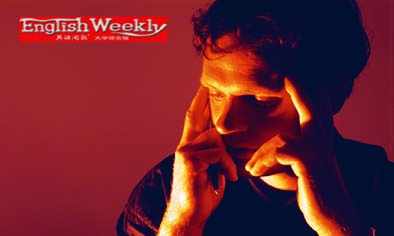| ‘Sleeping on it’ best for complex decisions |
| http://www.sina.com.cn 2006/11/15 21:51 英语周报大学版 |
 ‘Sleeping on it’ best for complex decisions ‘Sleeping on it’ best for complex decisions By Gaia Vince 秦毅忠 译 Complex decisions are best left to your unconscious mind to work out, according to a new study, and over-thinking a problem could lead to expensive mistakes. The research suggests the conscious mind should be trusted only with simple decisions, such as selecting a brand of oven glove. Sleeping on a big decision, such as buying a car or house, is more likely to produce a result people remain happy with than consciously weighing up the pros and cons of the problem, the researchers say. Thinking hard about a complex decision that rests on multiple factors appears to bamboozle the conscious mind so that people only consider a subset of information, which they weight inappropriately, resulting in an unsatisfactory choice. In contrast, the unconscious mind appears able to ponder over all the information and produce a decision that most people remain satisfied with. Ap Dijksterhuis at the University of Amsterdam in the Netherlands, and colleagues recruited 80 people for a series of lab-based and “real-world” tests. The participants were provided with information and asked to make decisions about simple and complex purchases, ranging from shampoos to furniture to cars. Snap decisions In one of the tests, half of the participants were asked to ponder on the information they were given and then decide which among similar products to buy. The other half were shown the information but then made to perform a series of puzzles including anagrams and simple arithmetic. At the end of the puzzle session, the participants were asked to make a snap decision about the products. “We found that when the choice was for something simple, such as purchasing oven gloves or shampoo, people made better decisions — ones that they remained happy with — if they consciously deliberated over the information,” says Dijksterhuis. “But once the decision was more complex such as for a house, too much thinking about it led people to make the wrong choice. Whereas, if their conscious mind was fully occupied on solving puzzles, their unconscious could freely consider all the information and they reached better decisions.” Expectation counts However, the unconscious mind appears to need some instruction. “It was only when people were told before the puzzles that they would need to reach a decision that they were able to come up with the right one,” Dijksterhuis told New Scientist. If they were told that none of what they had been shown was important before being given the puzzles, they failed to make satisfactory choices. “At some point in our evolution, we started to make decisions consciously, and we’re not very good at it. We should learn to let our unconscious handle the complicated things,” Dijksterhuis says. |
| 做复杂的决定时最好“先放放再说” |
参考译文: 做复杂的决定时最好“先放放再说” 一项新的研究表明,对于那些复杂的决定,最好是无意识地去做出选择,过度思考一个问题可能会导致代价高昂的错误。 研究指出,只有在做一些简单的决定时,有意识的思考才可以信赖,比如选购某种牌子的烤箱手套。研究人员说,在做出重大决定(比如购买汽车或者房子)时,先放一放比有意识地去权衡问题的利弊更有可能产生让人感到愉快的结果。 过度考虑一个受多种因素影响的复杂决定似乎会使有意识的思考受到蒙蔽,人们因此只考虑到了相关信息的一个分枝,而且不适当地估量了这部分信息,结果做出一种令人不满意的选择。相比之下,无意识的思考似乎能够通盘考虑所有的信息,从而做出一种让大多数人都能感到满意的决定。 荷兰阿姆斯特丹大学的(心理学家)阿普•迪克斯特休伊斯及其同事们召集了80个人来做一系列的试验,这些试验分别在实验室和“真实场景”下进行。受试者预先得到一些相关信息,然后被要求分别对一些简单和复杂的购买行为做出决定,所购买的商品从洗头液到家具再到汽车不等。 仓促的决定 在一个试验中,一半的参与者被要求对他们所得到的信息进行仔细考虑,然后在那些相似的产品中做出购买决定。而另一半的参与者则在看到所给信息后被要求去做一系列的智力游戏,包括字谜游戏和一些简单的算术题等。在智力游戏结束后,参与者被要求对他们所要购买的产品快速做出决定。 迪克斯特休伊斯说:“我们发现当需要做出的选择是购买一些简单的东西,比如烤箱手套或者洗头液时,人们会做出更好的决断 ——— 这些决断令其感到愉快 ——— 如果他们对所给的信息做了有意识的充分思考的话。” “而一旦需要做出更为复杂的决定,比如说购买房子等,过多的思考就会使人做出错误的选择。相反,如果他们将有意识的思考全部用于解决智力游戏,他们的无意识就能无拘无束地去考虑所有的信息,从而做出更好的决定。” 期望值很重要 不过,无意识的思考似乎需要一些指导。迪克斯特休伊斯告诉《新科学家》杂志说:“只有当人们在做智力游戏之前被告知他们将需要做出一个决定时,他们才能够做出正确的选择。” 如果在做智力游戏之前,人们被告知出现在其眼前的东西没有一样是重要的,他们就不会做出令人满意的选择。 迪克斯特休伊斯说:“在我们进化的某个阶段,我们开始有意识地做出决定,但我们并不十分擅长这一点。我们应该学会让我们的无意识去处理一些复杂的事情。” |
| 【发表评论】 |
|
|
| 【评论】【论坛】【收藏此页】【大 中 小】【多种方式看新闻】【下载点点通】【打印】【关闭】 |